2019高三英语(外研版)一轮预习案4.3 Body Language and Non-verbal Communication Word版含解析
2019届高三英语外研版复习教案:必修4 Unit 3 Body Language and Non-Verbal Communication Word版含解析
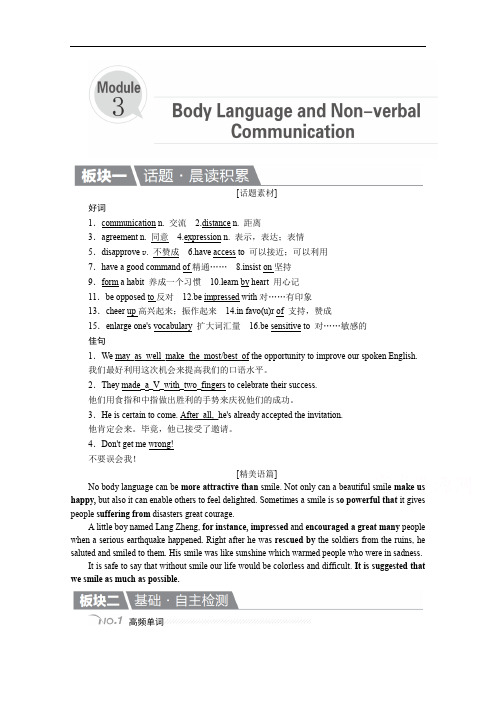
[话题素材]好词1.communication n. 交流 2.distance n. 距离3.agreement n. 同意 4.expression n. 表示,表达;表情5.disapprove v. 不赞成 6.have access to 可以接近;可以利用7.have a good command of精通……8.insist on坚持9.form a habit 养成一个习惯10.learn by heart 用心记11.be opposed to反对12.be impressed with对……有印象13.cheer up高兴起来;振作起来14.in favo(u)r of 支持,赞成15.enlarge one's vocabulary 扩大词汇量16.be sensitive to 对……敏感的佳句1.We may_as_well_make_the_most/best_of the opportunity to improve our spoken English.我们最好利用这次机会来提高我们的口语水平。
2.They made_a_V_with_two_fingers to celebrate their success.他们用食指和中指做出胜利的手势来庆祝他们的成功。
3.He is certain to come. After_all,_he's already accepted the invitation.他肯定会来。
毕竟,他已接受了邀请。
4.Don't get me wrong!不要误会我![精美语篇]No body language can be more attractive than smile. Not only can a beautiful smile make us happy, but also it can enable others to feel delighted. Sometimes a smile is so powerful that it gives people suffering from disasters great courage.A little boy named Lang Zheng, for instance, impressed and encouraged a great many people when a serious earthquake happened. Right after he was rescued by the soldiers from the ruins, he saluted and smiled to them. His smile was like sunshine which warmed people who were in sadness.It is safe to say that without smile our life would be colorless and difficult. It is suggested that we smile as much as possible.高频单词1.stare (v i.) 凝视;盯着看2.panic (v.) 恐慌;惊慌(n.) 恐慌;大惊慌3.aggressive (adj.) 攻击的;挑衅的4.live (adj.) 现场的5.spread (v i.) 张开→spread (过去式) spread (过去分词)6.favour (n.) 恩惠;善意的行为→favourite (adj.) 最喜欢的(n.)最喜爱的东西7.communicate_ (v i.) (用语言、信号)传递信息;交流→communication (n.) 交流;沟通8.formal (adj.) 正式的→informal (反义词) (adj.) 非正式的9.unconscious (adj.) 无意的;不知不觉的→conscious (adj.) 意识到的;自觉的10.vary (v i.) 变化→variety (n.) 种类→various (adj.) 各种各样的11.traditionally (ad v.) 传统地→traditional (adj.) 传统的→tradition (n.) 传统12.threatening (adj.) 恐吓的;具有威胁的→threaten (v.) 威胁→threat (n.) 威胁13.performance (n.) 表演→perform (v.) 表演;运行;表现→performer (n.) 表演者14.judgement (n.) 判断;意见→judge (v.) 判断(n.) 裁判;法官15.equality (n.) 平等→equal (adj.) 平等的→equally (ad v.) 平等地重点短语1.communicate_with_sb.和某人交流2.vary_from...to 从……到……变化3.on_guard (保持)警惕4.make_a_deal 达成协议;做成交易5.hold/lift_up 举起6.give_away 暴露(自己的情况)7.up_and_down 上上下下地8.by_accident 偶然地9.say_hello_to_sb. 向某人问好10.switch_on 打开(灯,无线电等)热点句型1.as 引导方式状语从句When in Rome, do as_Romans_do.(教材P22)入乡随俗。
2019版高考英语一轮复习Module3BodyLanguageandNonverbalCommun
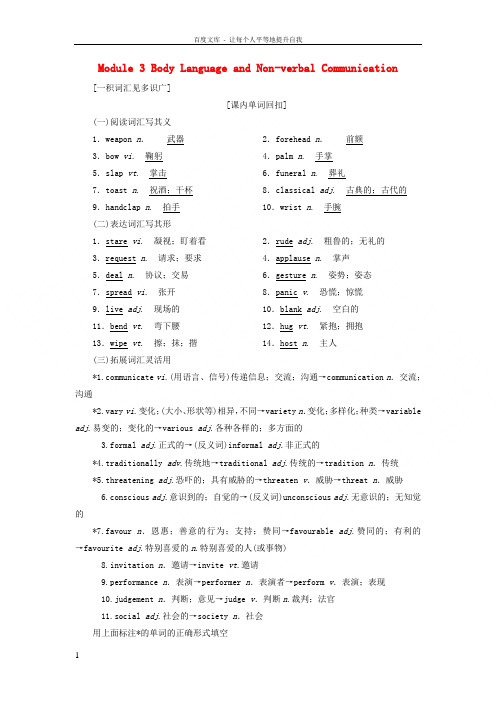
Module 3 Body Language and Non-verbal Communication[一积词汇见多识广][课内单词回扣](一)阅读词汇写其义1.weapon n.武器2.forehead n.前额3.bow vi. 鞠躬4.palm n. 手掌5.slap vt. 掌击6.funeral n. 葬礼7.toast n. 祝酒;干杯8.classical adj. 古典的;古代的9.handclap n. 拍手10.wrist n. 手腕(二)表达词汇写其形1.stare vi. 凝视;盯着看2.rude adj. 粗鲁的;无礼的3.request n. 请求;要求4.applause n. 掌声5.deal n. 协议;交易6.gesture n. 姿势;姿态7.spread vi. 张开8.panic v. 恐慌;惊慌9.live adj. 现场的10.blank adj. 空白的11.bend vt. 弯下腰12.hug vt. 紧抱;拥抱13.wipe vt. 擦;抹;揩14.host n. 主人(三)拓展词汇灵活用*municate vi.(用语言、信号)传递信息;交流;沟通→communication n.交流;沟通*2.vary vi.变化;(大小、形状等)相异,不同→variety n.变化;多样化;种类→variable adj.易变的;变化的→various adj.各种各样的;多方面的3.formal adj.正式的→(反义词)informal adj.非正式的*4.traditionally adv.传统地→traditional adj.传统的→tradition n.传统*5.threatening adj.恐吓的;具有威胁的→threaten v.威胁→threat n.威胁6.conscious adj.意识到的;自觉的→(反义词)unconscious adj.无意识的;无知觉的*7.favour n.恩惠;善意的行为;支持;赞同→favourable adj.赞同的;有利的→favourite adj.特别喜爱的n.特别喜爱的人(或事物)8.invitation n.邀请→invite vt.邀请9.performance n.表演→performer n.表演者→perform v.表演;表现10.judgement n.判断;意见→judge v.判断n.裁判;法官11.social adj.社会的→society n.社会用上面标注*的单词的正确形式填空1.There is a tradition in our family that we have a party on New Year's Eve. We usually have China's traditional food — dumplings on that day.(tradition) 2.Being out of work is threatening. But the threat can urge the workers to work harder.(threat)3.I'm in favour of the plan, which will be favourable to the development of children.(favour)4.In our daily life, communication plays an important part, so it's important to develop the ability to communicate with others.(communicate)5.There are a variety of animals and plants in the world. They vary in shape and size and exist in many parts of the world. But for various reasons, some of them are dying out.(vary)[话题单词积累]1.greet/ɡriːt/ vt. 迎接;问候2.approach/ə'prəʊtʃ/ v. 接近;靠近;走近3.cheek/tʃiːk/ n. 面颊4.misunderstand/ˌmIsʌndə'stænd/ vt.误解;误会5.misunderstanding/ˌmIsʌndə'stændIŋ/ n.误解;误会6.understanding/ʌndə'stændIŋ/ n. 理解7.spoken/'spəʊk(ə)n/ adj. 口语的8.unspoken/ˌʌn'spəukən/ adj. 未说出口的;非口语的9.posture/'pɒstʃə/ n. 姿势;体态10.frown/fraʊn/ v. 皱眉;蹙额11.misread/mIs'riːd/ vt. 读错,误解12.facial/'feIʃ(ə)l/ adj. 面部的13.anger/'æŋɡə/ n. 怒气,怒火14.fist/fIst/ n. 拳头15.yawn/jɔːn/ vi. 打哈欠16.kiss/kIs/ n.& v. 吻17.touch/tʌtʃ/ v. 触摸18.shoulder/'ʃəʊldə/ n. 肩膀19.nod/nɒd/ n.& v. 点头20.disagreement/dIsə'ɡriːmənt/ n. 不同意21.agreement/ə'ɡriːm(ə)nt/ n. 同意22.roll/rəʊl/ v. 转动;滚动23.clap/klæp/ n.& v. 鼓掌;拍手24.pat/pæt/ vt. 轻拍25.shrug/ʃrʌɡ/ v. 耸肩26.finger/'fIŋɡə/ n. 手指27.offence/ə'fens/ n. 过错28.confusing/kən'fjuːzIŋ/ adj. 令人困惑的[二积短语顿挫抑扬][课内短语回扣](一)根据汉语写出下列短语municate_with 和……交流2.vary_from_..._to_... 从……到……变化3.shake_hands_with 与……握手*4.on_guard (保持)警惕5.make_a_deal 达成协议;做成交易*6.hold_up 举起;阻碍;承受住*7.give_away_ 暴露(自己的情况);捐赠8.lift_up_ 举起;抬起9.up_and_down 一上一下地;起起落落;来来回回*10.by_accident_ 偶然地11.say_hello_to_ 向……问好12.switch_on_ 打开(灯、无线电等)(二)用上面标注*的短语完成下列句子1.John said he wasn't disappointed at the result of the basketball game, but the look on his face gave him away.2.He must have been held_up on his way here in the traffic jam.3.A lot of famous scientists made some amazing discoveries by_accident while they were actually looking for something else.4.You should be on_guard when a stranger stands in front of your house.[话题短语积累]1.show respect for 对……表示尊重2.on purpose 故意地3.turn one's back to 背对4.lose face 丢脸5.at ease 舒适;快活;自由自在6.step back 后退7.put up 举起8.in defence 防卫9.reach one's hand out 伸出手10.close to 靠近11.be likely to 很可能12.from side to side 从一边到另一边13.look away from 把目光从……移开14.be quiet 安静15.point to 指向16.be aware of 知道,了解17.turn around 转身18.agree with 同意[三积句式写作扮靓][课内句式仿写]1.“more tha n+n.”表示“不仅仅是,不只是”[例句] Although these are very important, we communicate with more than just spoken and written words.[仿写] 自信心不仅仅是一种态度;它来自于一个坚定的承诺来承担责任,而不是随波逐流。
2019高三英语外研版一轮课件4.3 Body Language and Non-verbal Communication

(finish)this morning. (2)写作升级 ④Every student is requested to attend the forum on time. →[满分表达] It is requested that every student(should)attend the forum on time. (用形式主语it)
四维热练 (1)单句语法填空 ①The prices of vegetables vary with the season. ②When Christmas comes,cards of various (vary)shapes and sizes
are sold in shops. ③ Varieties (vary)of TV programs can accommodate to everyone’s spiritual needs. ④The goods in the supermarket vary in size,color and price. (2)单句写作 ⑤我们应该鼓励学生参加各种各样的课外活动。(variety)
必修4
Module 3 Body Language and Non-verbal Communication
主题语境:人与自我——语言学习
高频单词 重点短语 难点句型
1.vary vi.变化 vt.改变;变更 [教材原句] We see examples of unconscious body language very
4.request n.请求;要求;需要 vt.请求;要求;需要 [靓句背诵] The guide requested that her visitor(should)not park her
高考英语一轮复习 Module3 BodyLanguageandNonverbalCommunication教学案 外研版必修4
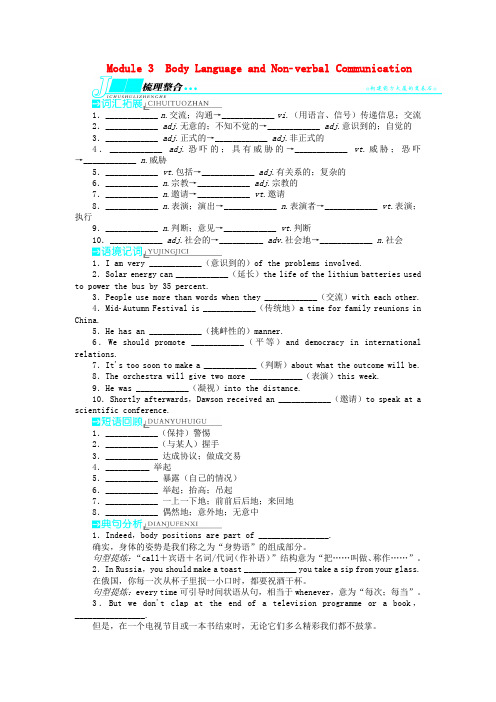
Module 3 Body Language and Nonverbal Communication1.____________ n.交流;沟通→____________ vi.(用语言、信号)传递信息;交流2.____________ adj.无意的;不知不觉的→____________ adj.意识到的;自觉的3.____________ adj.正式的→____________ adj.非正式的4.____________ adj.恐吓的;具有威胁的→____________ vt.威胁;恐吓→____________ n.威胁5.____________ vt.包括→____________ adj.有关系的;复杂的6.____________ n.宗教→____________ adj.宗教的7.____________ n.邀请→____________ vt.邀请8.____________ n.表演;演出→____________ n.表演者→____________ vt.表演;执行9.____________ n.判断;意见→____________ vt.判断10.____________ adj.社会的→__________ adv.社会地→____________ n.社会1.I am very ____________(意识到的)of the problems involved.2.Solar energy can ____________(延长)the life of the lithium batteries used to power the bus by 35 percent.3.People use more than words when they ____________(交流)with each other.4.MidAutumn Festival is ____________(传统地)a time for family reunions in China.5.He has an ____________(挑衅性的)manner.6.We should promote ____________(平等)and democracy in international relations.7.It's too soon to make a ____________(判断)about what the outcome will be.8.The orchestra will give two more ____________(表演)this week.9.He was ____________(凝视)into the distance.10.Shortly afterwards,Dawson received an ____________(邀请)to speak at a scientific conference.1.____________(保持)警惕2.____________(与某人)握手3.____________ 达成协议;做成交易4.__________ 举起5.____________ 暴露(自己的情况)6.____________ 举起;抬高;吊起7.____________ 一上一下地;前前后后地;来回地8.____________ 偶然地;意外地;无意中1.Indeed,body positions are part of ________________.确实,身体的姿势是我们称之为“身势语”的组成部分。
2019学年高考英语一轮复习Module3BodyLanguageandNon_verbalCommunication课件外研版必修4
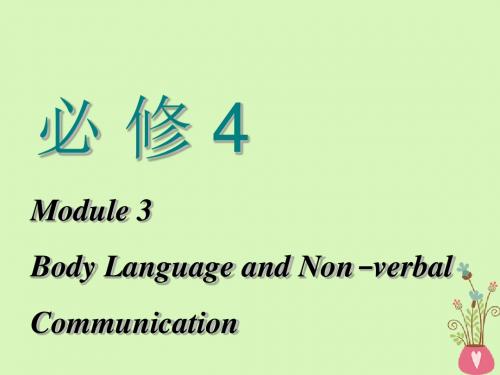
古典的;古代的
掌声 延长 拍手 有感染性的 葬礼
表达单词
1. aggressive adj. 2. deal 3. involve n. v t. 攻击的;挑斗的;挑衅的 协议;交易 包括;包含 轻微地;稍微 张开;蔓延 紧抱;拥抱
4. slightly adv. 5. spread 6. hug v t. v i.
必修4
Module 3
Body Language and Non-verbal Communication
Contents
1
课前——双基2级刷
2
课堂——考点3关过
3
课后——高考分块练
课前
双基2级刷
一、刷黑板
——词汇全听写(先过识记默写关)
Ⅰ.阅读词汇(英译汉)
1.weapon n. 2.gesture n. 3.Muslim n. 4.salaam n.
7. stare vi. 8. blank adj. 9. panic v. 10. rude adj. 11. invitation n. 12. request n. 13. live adj.
凝视;盯着看 空白的;茫然的 恐慌;惊慌 粗鲁的;无礼的 邀请 请求;要求 现场的
[ 语境活用]
1. The fire was spreading (蔓延) fast, but we were finally able
印度人 _____
鞠躬 ____ 手掌 ____
掌击 ____
(___________________ 自称或被认为)能看透别人
心思的人 ________
11.ankle n. 12.eyebrow n. 13.lip n. 14.wrist n. 15.bend vt.(bent, bent)
2019版高考英语一轮复习 第一部分 Module 3 Body Language and Non-verbal Communication 外研版必修4
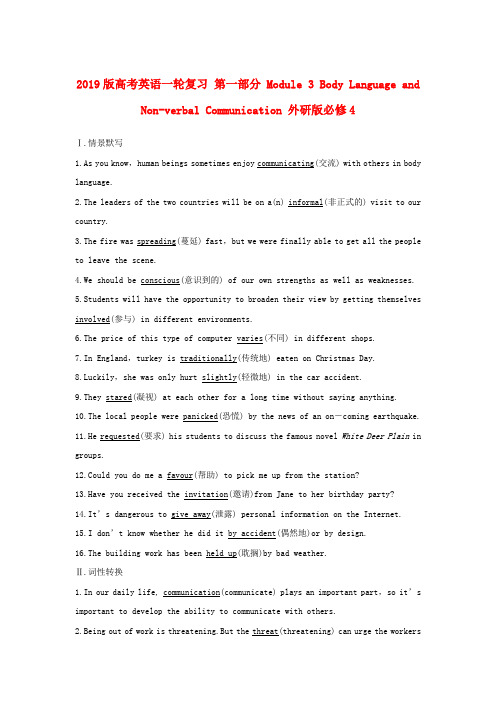
2019版高考英语一轮复习第一部分 Module 3 Body Language and Non-verbal Communication 外研版必修4Ⅰ.情景默写1.As you know,human beings sometimes enjoy communicating(交流) with others in body language.2.The leaders of the two countries will be on a(n) informal(非正式的) visit to our country.3.The fire was spreading(蔓延) fast,but we were finally able to get all the people to leave the scene.4.We should be conscious(意识到的) of our own strengths as well as weaknesses.5.Students will have the opportunity to broaden their view by getting themselves involved(参与) in different environments.6.The price of this type of computer varies(不同) in different shops.7.In England,turkey is traditionally(传统地) eaten on Christmas Day.8.Luckily,she was only hurt slightly(轻微地) in the car accident.9.They stared(凝视) at each other for a long time without saying anything.10.The local people were panicked(恐慌) by the news of an on-coming earthquake.11.He requested(要求) his students to discuss the famous novel White Deer Plain in groups.12.Could you do me a favour(帮助) to pick me up from the station?13.Have you received the invitation(邀请)from Jane to her birthday party?14.It’s dangerous to give away(泄露) personal information on the Internet.15.I don’t know whether he did it by accident(偶然地)or by design.16.The building work has been held up(耽搁)by bad weather.Ⅱ.词性转换1.In our daily life, communication(communicate) plays an important part,so it’s important to develop the ability to communicate with others.2.Being out of work is threatening.But the threat(threatening) can urge the workersto work harder.3.I’m in favour of the plan,which will be favourable(favour) to the development of children.4.There is a variety of animals and plants in the world.They vary in shape and size and exist in many parts of the world.But for various reasons,some of them are dying out.(vary)5.Walking on the street,I found an old man lying on the ground unconscious(conscious).When I was conscious that the old man was in danger,I called the emergency service.6.There is a tradition in our family that we have a party on New Year’s Eve.We usually have China’s traditional(tradition) food—dumplings on that day.1.句型公式:more than不仅仅;多于,超过,超出;非常《中国日报》不仅仅是一种报纸,它还有助于提高我们的英语水平。
2019届一轮复习外研版必修四Module 3 Body Language and Non-verbal Communication单元学案
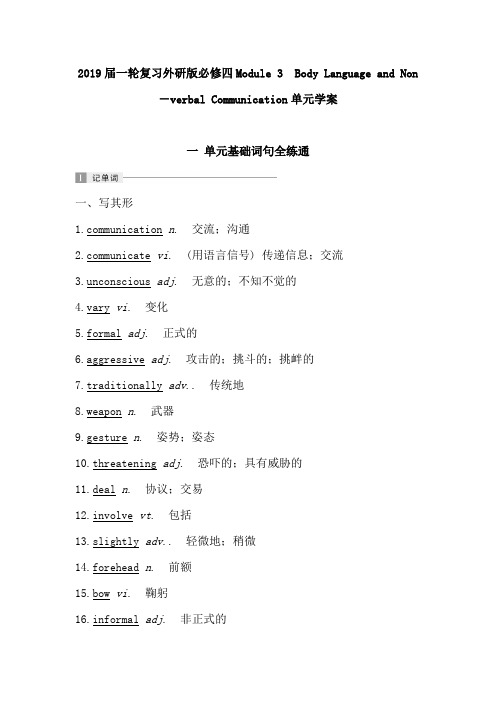
2019届一轮复习外研版必修四Module 3 Body Language and Non -verbal Communication单元学案一单元基础词句全练通一、写其形munication n. 交流;沟通municate vi. (用语言信号) 传递信息;交流3.unconscious adj. 无意的;不知不觉的4.vary vi. 变化5.formal adj. 正式的6.aggressive adj. 攻击的;挑斗的;挑衅的7.traditionally adv.. 传统地8.weapon n. 武器9.gesture n. 姿势;姿态10.threatening adj. 恐吓的;具有威胁的11.deal n. 协议;交易12.involve vt. 包括13.slightly adv.. 轻微地;稍微14.forehead n. 前额15.bow vi. 鞠躬rmal adj. 非正式的17.youth n. 年轻人18.palm n. 手掌19.spread vi.(spread,spread)张开20.conscious adj. 意识到的;自觉的21.lip n. 嘴唇22.wrist n. 手腕23.bend vt.(bent,bent) 弯下腰24.hug vt. 紧抱;拥抱25.stare vi. 凝视;盯着看26.wipe vt. 擦;抹;揩27.host n. 主人28.blank adj. 空白的29.panic v. 恐慌;惊慌30.rude adj. 粗鲁的;无礼的31.invitation n. 邀请32.request n. 请求;要求33.favour n. 恩惠;善意的行为34.live adj. 现场的35.performance n. 表演36.performer n. 表演者37.classical adj. 古典的;古代的38.applause n. 掌声39.judgement n. 判断;意见40.equality n. 平等41.social adj. 社会的二、知其意1.Muslim n. (常作复数)穆斯林2.salaam n. (穆斯林的)额手礼(用右手抚额鞠躬的礼节)3.Hindu n. 印度人4.slap vt. 掌击5.mind reader n. (自称或被认为)能看透别人心思的人6.ankle n. 脚踝7.eyebrow n. 眉毛8.religion n. 宗教9.toast n. 祝酒;干杯10.sip n. 一抿之量;小口喝11.RSVP (请帖等用语) 请答复12.prolong vt. 延长13.handclap n. 拍手14.infectious adj. 有感染性的15.funeral n. 葬礼1.shake hands with 与……握手2.on guard (保持) 警惕3.make a deal 达成协议;做成交易4.hold up 举起;阻碍;延误5.give away 暴露 (自己的情况)6.lift up 举起7.up and down 一上一下地8.by accident 偶然地9.say hello to 向……问好10.switch on 打开 (灯、无线电等)1.Although these are very important,we communicate with more than just spoken and written words.尽管这些很重要,但我们并不只是通过口头和书面语言交流。
高考英语一轮复习Module3BodyLanguageandNon-verbal预习案外研版必修4
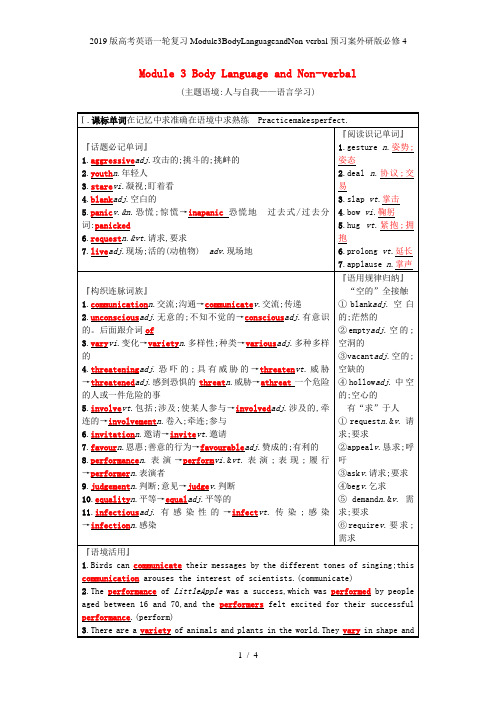
Module 3 Body Language and Non-verbal (主题语境:人与自我——语言学习)size and exist in many parts of the world.But for various reasons,some of them are dying out.(vary)4.Walking on the street,I found an old man lying on the ground,unconscious.WhenI was conscious that the old man was in danger,I called the emergency service.(conscious)Ⅳ.语篇旧材新用探究根源Killtwobirdswithonestone.『话题与语篇填空』Words and sentences are important in munication(communicate),but we communicate with not only spoken and 2.written(write) words,but also body language.Body language 3.varies(vary) from culture to culture.Every culture has developed a formal way 4.togreet(greet) strangers to show them they are not aggressive.5.Traditionally(traditional),Europeans and Americans shake hands,6.which means they trust each other.Greetings are different around the world.Traditionally in China,we put the right hand over the left and bow 7.slightly(slight).Muslims give a “salaam”,where they to uch their heart,mouth and forehead.Hindus join their hands and bow their heads 8.in respect.Today,people still use their hands in informal greetings,which also means trust.American youths often greet each other with the 9.expression(express),“Give me five!”Body language can convey more information than words,so people easily give themselves 10.away by their gestures. 『话题与短文改错』Applause wassign of being part of the community,and ofbetween actors and audience.The important thing was to make the noise to gether,to add one’s own small handclapothers.Clapping is social,likelaughter:you don’t very often claplaugh out loud.It is like laughter inway,too:it is infectious,and spreads veryquickly.at concerts and theatres is a universal habit.But some occasions onpeople clapfrom one country to another.Foran example,in Britain people clap at a wedding,but in Italy they sometimes clap at a funeral.。
2019届高考英语一轮复习第一部分教材课文要点Module3BodyLanguageandNon_verbalCommunication课件外研版必
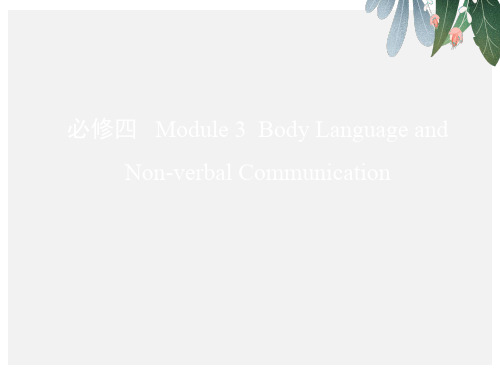
完成句子 ⑤ Hold on a moment and I will go to your rescue. 坚持一下,我这就去救你。 ⑥We thought of selling this old furniture. But we’ve decided to hold on to it. It might be valuable. 我们原来考虑卖掉这件旧家具, 但我们现在决定留着它,它可能会很值 钱。
语境应用
选词填空(give away/give up/give out/give way to) ①He often came to check their studies and give out new assignments. ②He gave away most of his money to the homeless in the earthquakestricken area. ③Despite all these discouragements, she refused to give up . ④We mustn’t give in to these unreasonable demands.
句型转换 ⑥They requested us not to smoke in the office. →They requested that we should not smoke in the office. →It was requested that we should not smoke in the office.
必修四 Module 3 Body Language and Non-verbal Communication
语言点用法过关
1.vary v.改变;使多样化;变化 教材原句 We see examples of unconscious body language very often, yet there is also “learned” body language, which varies from culture to culture.我们 经常看到无意识的身势语,但也有“习得”的身势语。它们在不同的文 化中各不相同。
2019版高考英语(外研版)总复习教师用书必修4 Module 3 Body Language and Non verbal Communication含答案
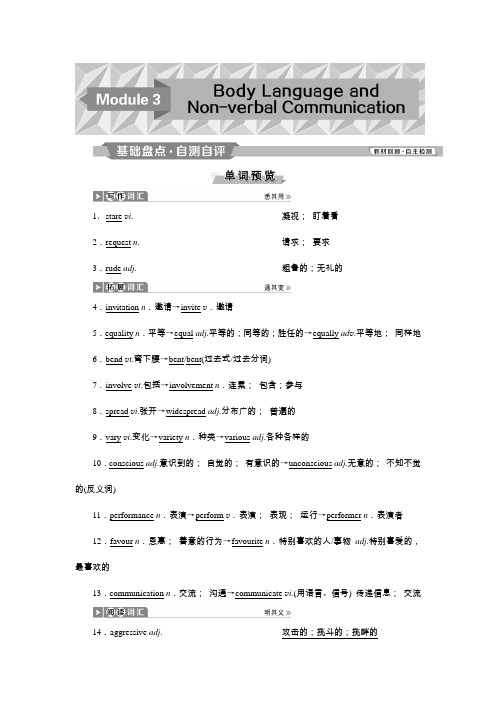
1.stare v i.凝视;盯着看2.request n. 请求;要求3.rude adj. 粗鲁的;无礼的4.invitation n.邀请→invite v.邀请5.equality n.平等→equal adj.平等的;同等的;胜任的→equally ad v.平等地;同样地6.bend v t.弯下腰→bent/bent(过去式/过去分词)7.involve v t.包括→involvement n.连累;包含;参与8.spread v i.张开→widespread adj.分布广的;普遍的9.vary v i.变化→variety n.种类→various adj.各种各样的10.conscious adj.意识到的;自觉的;有意识的→unconscious adj.无意的;不知不觉的(反义词)11.performance n.表演→perform v.表演;表现;运行→performer n.表演者12.favour n.恩惠;善意的行为→favourite n.特别喜欢的人/事物adj.特别喜爱的,最喜欢的13.communication n.交流;沟通→communicate v i.(用语言、信号) 传递信息;交流14.aggressive adj. 攻击的;挑斗的;挑衅的15.traditionally ad v. 传统地16.weapon n. 武器17.gesture n. 姿势;姿态18.threatening adj. 恐吓的;具有威胁的19.deal n. 协议;交易20.slightly ad v. 轻微地;稍微21.forehead n. 前额22.bow v i. 鞠躬23.youth n. 年轻人__ 24.palm n. 手掌25.slap v t. 掌击26.hug v t. 紧抱;__拥抱27.lip n. 嘴唇__28.wrist n. 手腕29.wipe v t. 擦;抹;揩30.toast n. 祝酒;干杯31.blank adj. 空白的32.classical adj. 古典的;古代的33.panic v. 恐慌;惊慌34.judgement n. 判断;意见35.applause n. 掌声__36.social adj. 社会的37.funeral n. 葬礼38.religion n. 宗教39.infectious adj. 有感染性的[用所给词的适当形式填空]1.He performed very well last night. His performance was highly thought of.(perform)2.There are a variety of animals and plants in the world. They vary in shape and size and exist in many parts of the world. But for various reasons, some of them are dying out.(vary) 3.Walking on the street, I found an old man lying on the ground unconscious.When I was conscious that the old man was in danger, I called the emergency service.(conscious) 4.In our daily life, communication plays an important part, so it’s important to develop the ability to__communicate with others.(communicate)1.on__guard (保持)警惕2.make__a__deal 达成协议;做成交易3.hold__up 举起;阻碍;延误4.give__away 暴露(自己的情况);捐赠5.lift__up 举起6.up__and__down 一上一下地7.by__accident 偶然地8.say__hello__to 向……问好9.switch__on 打开(灯、无线电等)[选用上面的短语填空]1.The couple were so generous that they gave__away 10,000 yuan to the victims of the earthquake.2.He paced up__and__down restlessly, trying to put his thoughts in order.3.The police warned people to be on__guard against pickpockets during the Christmas rush.4.I met my college friend in the street yesterday by__accident,__who is now a boss of a software company.5.The finals of the football was held__up by a heavy storm.“空的”形容词全接触①blank空白的;茫然的②empty 空的;空洞的③vacant 空的;空缺的不同姿态的“请求”①request n.&v. 请求;要求②ask v. 请求,要求③beg v. 乞求④require v. 要求;需要⑤appeal v. 恳求;呼吁由up and down想到的①back and forth 来来回回②day and night 日日夜夜③here and there 到处④now and then 时而,不时⑤right and left 到处;左右两边1.more than不仅仅;多于,超过,超出;非常Although these are very important, we communicate with more than just spoken and written words.2.介词+what引导的宾语从句Indeed, body positions are part of what we call “body language”.3.every time+时间状语从句In Russia you should make a toast every time you take a sip from your glass.4.however (=no matter how)+adj./adv.+主语+其他成分,意为“无论多么……”But we don’t clap at the end of a television programme or a book, however good they are.[句式仿写]1.自信心不仅仅是一种态度;它来自于一个坚定的承诺来承担责任,而不是随波逐流。
2019高考外研版英语一轮复习讲义: 第1部分 必修4 Module 3 Body Language
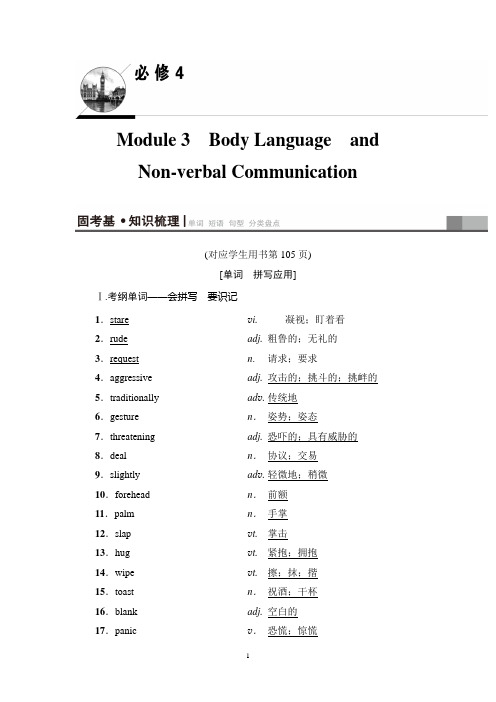
Module 3Body Language and Non-verbal Communication(对应学生用书第105页)[单词拼写应用]Ⅰ.考纲单词——会拼写要识记1.stare v i.凝视;盯着看2.rude adj.粗鲁的;无礼的3.request n. 请求;要求4.aggressive adj.攻击的;挑斗的;挑衅的5.traditionally ad v.传统地6.gesture n.姿势;姿态7.threatening adj.恐吓的;具有威胁的8.deal n.协议;交易9.slightly ad v.轻微地;稍微10.forehead n.前额11.palm n.手掌12.slap v t.掌击13.hug v t.紧抱;拥抱14.wipe v t.擦;抹;揩15.toast n.祝酒;干杯16.blank adj.空白的17.panic v.恐慌;惊慌18.classical adj.古典的;古代的19.judgement n.判断;意见20.social adj.社会的21.funeral n.葬礼Ⅱ.派生单词——能辨别1.communicate v i.(用语言、信号) 传递信息;交流→communication n.交流;沟通2.conscious adj.意识到的;自觉的;有意识的→unconscious adj.无意的;不知不觉的(反义词)3.vary v i.变化→variety n.种类→various adj.各种各样的4.involve v t.包括→involvement n.连累;包含5.spread v i.张开→widespread adj.分布广的;普遍的6.bend v t.弯下腰→bent/bent(过去式/过去分词)7.invite v.邀请→invitation n.邀请8.favour n.恩惠;善意的行为→favourite n.特别喜欢的人/事物adj.特别喜爱的9.perform v.表演;表现;运行→performer n.表演者→performance n.表演10.equal adj.平等的→equally ad v.平等地;同样地→equality n.平等Ⅲ.语境应用(用所给词的适当形式填空)1.He performed very well last night.His performance was highly thought of.(perform)2.There are a variety of animals and plants in the world.They vary in shape and size and exist in many parts of the world.But for various reasons,some of them are dying out.(vary)3.Walking on the street,I found an old man lying on the ground unconscious.When I was conscious that the old man was in danger,I called the emergency service.(conscious)4.In our daily life,communication plays an important part,so it's important to develop the ability to communicate with others.(communicate)。
高三英语一轮复习 Module 3 Body Language and Nonverbal Communication阅读案 外研版必修4
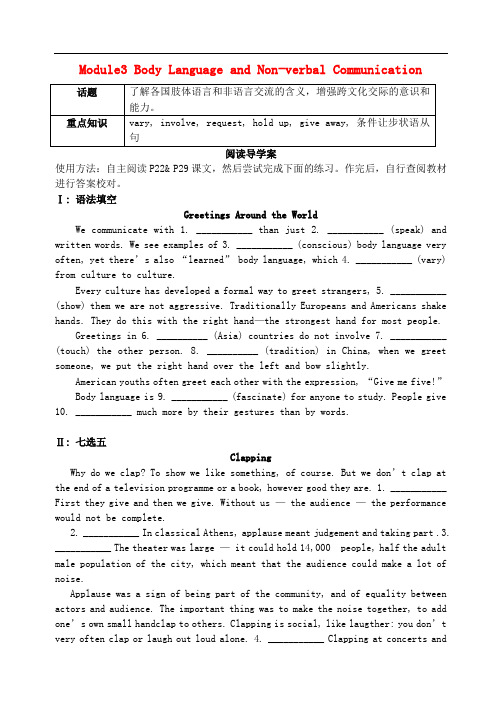
Module3 Body Language and Non-verbal Communication阅读导学案使用方法:自主阅读P22& P29课文,然后尝试完成下面的练习。
作完后,自行查阅教材进行答案校对。
Ⅰ: 语法填空Greetings Around the WorldWe communicate with 1. ___________ than just 2. ___________ (speak) and written words. We see examples of 3. ___________ (conscious) body language very often, yet there’s also “learned” body language, which 4. ___________ (vary) from culture to culture.Every culture has developed a formal way to greet strangers, 5. ___________ (show) them we are not aggressive. Traditionally Europeans and Americans shake hands. They do this with the right hand—the strongest hand for most people.Greetings in 6. __________ (Asia) countries do not involve 7. ___________ (touch) the other person. 8. __________ (tradition) in China, when we greet someone, we put the right hand over the left and bow slightly.American youths often greet each other with the expression, “Give me five!”Body language is 9. ___________ (fascinate) for anyone to study. People give 10. ___________ much more by their gestures than by words.Ⅱ: 七选五ClappingWhy do we clap? To show we like something, of course. But we don’t clap at the end of a television programme or a book, however good they are. 1. ___________ First they give and then we give. Without us — the audience — the performance would not be complete.2. ___________ In classical Athens, applause meant judgement and taking part .3. ___________ The theater was large — it could hold 14,000 people, half the adult male population of the city, which meant that the audience could make a lot of noise.Applause was a sign of being part of the community, and of equality between actors and audience. The important thing was to make the noise together, to add one’s own small handclap to others. Clapping is social, like laugther: you don’t very often clap or laugh out loud alone. 4. ___________ Clapping at concerts andtheatres is a universal habit. But some occasions on which people clap change from one country to another. 5. ___________A.Plays were often in competition with each other, and prolonged clappinghelped a play to win.B.For example, people clap at the end of a live performance but not atelevision programme or a book.ughter is infectious and spreads very quickly.D.The custom of clapping has early beginnings.E.We clap at the end of a live performance, such as a play, or a concert,to say thank you to the performers.F.For example, in Britain people clap at a wedding, but in Italy theysometimes clap at a funeral.G.It is like laughter in another way, too: it is infectious, and spreadsvery quickly.III. 课文重点句型翻译:1.我们经常会看到无意识的肢体语言的范例,然而也有可以习得的肢体语言,那是因文化而异的。
-高中英语《Module3 Body Language》预习学案(含答案) 外研版必修4
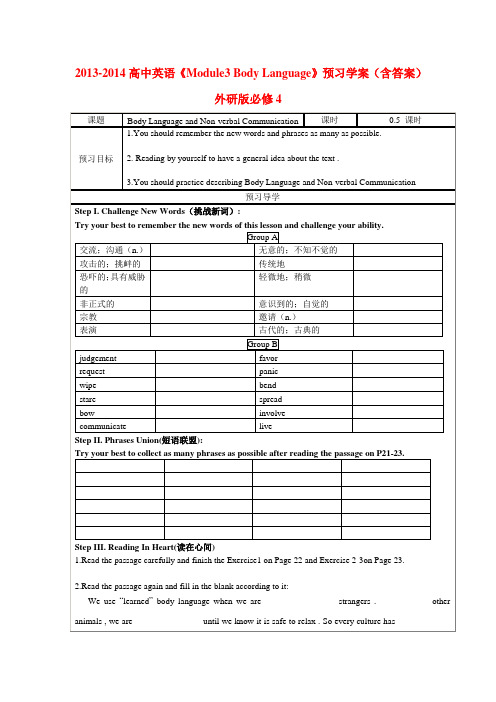
课题 课时 0.5 课时 Body Language and Non-verbal Communication 1.You should remember the new words and phrases as many as possible. 2. Reading by yourself to have a general idea about the text . 3.You should practice describing Body Language and Non-verbal Communication 预习导学 Step I. Challenge New Words(挑战新词): Try your best to remember the new words of this lesson and challenge your ability. Group A 交流;沟通(n.) 攻击的;挑衅的 恐吓的; 具有威胁 的 非正式的 宗教 表演 judgement request wipe stare bow communicate Step II. Phrases Union(短语联盟): Try your best to collect as many phrases as possible after reading the passage on P21-23. 无意的;不知不觉的 传统地 轻微地;稍微 意识到的;自觉的 邀请(n.) 古代的;古典的 Group B favor panic bend spread involve live
a formal way to greet strangers , to show them we are not aggressive . Traditionally , Europeans and Americans shake hands . They do this with the right hand ---the strongest hand for most people . If our right hand is __________ greeting someone , it ___________be holding a weapon . So the gesture is saying , “I trust you . Look , I’m not ___________ a threatening weapon .” If you shake hands _________ someone , you show you __________ them . We shake hands when we _________________ . It means, “We agree and we trust each other .” Step IV. Easy Points vs My Dictionary(玩转词典) 1. communicate: 词性 __________ 词义 __________________________ 短语 __________________________________ 典句 _____________________________________________________________________ ______________________________________________________________________ 2. involve : 词性 __________ 词义 __________________________ 短语 __________________________________ 典句 _____________________________________________________________________ ______________________________________________________________________ StepV. Thought Zone(反思空间): _____________________________________________________________________ ______________________________________________________________________ _____________________________________________________________________
- 1、下载文档前请自行甄别文档内容的完整性,平台不提供额外的编辑、内容补充、找答案等附加服务。
- 2、"仅部分预览"的文档,不可在线预览部分如存在完整性等问题,可反馈申请退款(可完整预览的文档不适用该条件!)。
- 3、如文档侵犯您的权益,请联系客服反馈,我们会尽快为您处理(人工客服工作时间:9:00-18:30)。
必修4Module3BodyLanguageandNon-verbalC ommunication(主题语境:人与自我——语言学习)Ⅰ.课标单词在记忆中求准确在语境中求熟练Practicemakesperfect.『话题必记单词』1.aggressive adj.攻击的;挑斗的;挑衅的2.youth n.年轻人3.stare vi.凝视;盯着看4.blank adj.空白的5.panic v.&n.恐慌;惊慌→inapanic恐慌地过去式/过去分词:panicked6.request n.&vt.请求,要求7.live adj.现场;活的(动植物)adv.现场地『阅读识记单词』1.gesture n.姿势;姿态2.deal n.协议;交易3.slap vt.掌击4.bow vi.鞠躬5.hug vt.紧抱;拥抱6.prolong vt.延长7.applause n.掌声『构织连脉词族』munication n.交流;沟通→communicate v.交流;传递2.unconscious adj.无意的;不知不觉的→conscious adj.有意识的。
后面跟介词of3.vary vi.变化→variety n.多样性;种类→various adj.多种多样的4.threatening adj.恐吓的;具有威胁的→threaten vt.威胁→threatened adj.感到恐惧的threat n.威胁→athreat一个危险的人或一件危险的事5.involve vt.包括;涉及;使某人参与→involved adj.涉及的,牵连的→involvement n.卷入;牵连;参与『语用规律归纳』Œ“空的”全接触①blank adj.空白的;茫然的②empty adj.空的;空洞的③vacant adj.空的;空缺的④hollow adj.中空的;6.invitation n.邀请→invite vt.邀请7.favour n.恩惠;善意的行为→favourable adj.赞成的;有利的8.performance n.表演→perform vi.&vt.表演;表现;履行→performer n.表演者9.judgement n.判断;意见→judge v.判断10.equality n.平等→equal adj.平等的11.infectious adj.有感染性的→infect vt.传染;感染→infection n.感染空心的•有“求”于人①request n.&v.请求;要求②appeal v.恳求;呼吁③ask v.请求;要求④beg v.乞求⑤demand n.&v.需求;要求⑥require v.要求;需求『语境活用』1.Birds can communicate their messages by the different tones of singing;this communication arouses the interest of scientists.(communicate)2.The performance of LittleApple was a success,which was performed by people aged between 16 and 70,and the performers felt excited for their successful performance.(perform)3.There are a variety of animals and plants in the world.They vary in shape and size and exist in many parts of the world.But for various reasons,some of them are dying out.(vary)4.Walking on the street,I found an old man lying on the ground,unconscious.When I was conscious that the old man was in danger,I called the emergency service.(conscious)Ⅱ.课标短语从表面理解到深层延伸从拓展中抓其规律Observationisthebestteacher.1.onguard(保持)警惕2.makeadeal达成协议;做成交易3.holdup举起4.giveaway暴露(自己的情况);出『语境活用』1.The citizens were warned to be onguard against a sudden typhoon attack.2.Let’s makeadeal;you’ll cook the dinner;meanwhile,I’ll have the house cleaned.卖;赠送5.upanddown一上一下地6.byaccident偶然地3.If you have a question,please holdup your hands.4.Don’t giveaway to the public when we will start.5.I don’t know whether he did it byaccident or by design.Ⅲ.重点句型从教材中探求高考脉动从仿写中熟练运用Nothingisimpossibleforawillingheart.『领悟教材语境』1.Indeed,body positions are part ofwhatwecall“bodylanguage”.事实上,身体姿势是我们所称为的“肢体语言”的一部分。
(教材Page 22)要点提炼what引导宾语从句,表示“……的事情/情况”。
2.One person then holds up hishand,palmoutwardsandfivefingersspread.然后一个人举起手,手掌向外,五指分开。
(教材Page 22)要点提炼“名词/代词+补足语”构成的独立主格结构,做伴随、方式等状语。
3.In Thailand you mustn’t touch someone on the head,even by accident.在泰国,你不许摸别人的头部,即使偶然性的。
(教材Page 25)要点提炼vt.+人称宾语+介词+the+身体部位。
『高考写作情景』①我经常想象我的未来生活是什么样子。
Ioftenimaginewhatmylifewillbelikeinthefuture.②由于眼镜摔坏了,她看不见黑板上的字。
Herglassesbroken,shecouldn’tseethewordsontheblackboard.③他碰了一下我的肩膀。
(touch) Hetouchedmeontheshoulder.Ⅳ.语篇旧材新用探究根源Killtwobirdswithonestone.『话题与语篇填空』Words and sentences are important inmunication(communicate),but we communicate with not only spoken and2.written(write) words,but also body language.Body language3.varies(vary) from culture to culture.Every culture has developed a formal way 4.togreet(greet) strangers to show them they are notaggressive.5.Traditionally(traditional),Europeans and Americans shake hands,6.which means they trust each other.Greetings are different around the world.Traditionally in China,we put the right hand over the left and bow 7.slightly(slight).Muslims give a “salaam”,where they touch their heart,mouth and forehead.Hindus join their hands and bow their heads 8.in respect.Today,people still use their hands in informal greetings,which also means trust.American youths often greet each other with the9.expression(express),“Give me five!”Body language can convey more information than words,so people easily give themselves 10.away by their gestures.『话题与短文改错』Applause was sign of being part of the community,and of between actors and audience.The important thing was to make the noise together,to add one’s own small handclap others.Clapping is social,like laughter:you don’t very often clap laugh out loud .It is like laughter in way,too:it is infectious,and spreads very quickly.at concerts and theatres is a universal habit.But some occasions on people clap from one country to another.Foranexample,in Britain people clap at a wedding,but in Italy they sometimes clap at a funeral.。
